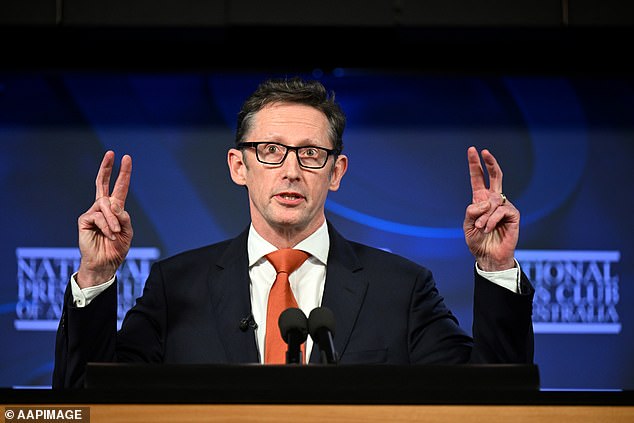Politicians are hypocrites, but you probably already knew that. It’s the nature of the profession.
Either they claim to have higher standards than they actually have, or politicians hold others to higher standards than they would hold themselves to.
There are many examples of the above and they are not limited to either side of the major party divide.
We also know that some independent MPs are not much better, such as Teal Party MP Zali Steggall, who this week complained about poor parliamentary standards – shortly after being forced to withdraw an unparliamentary comment in the chamber.
The latest example of hypocrisy by the current Labour government concerns the rules surrounding its new legislation aimed at improving parliamentary standards for MPs and Senators, compared to the way it is imposing new standards on tax professionals.
This comparison clearly highlights the hypocrisy of the government: happy to demand from others what it does not demand from itself.
The new parliamentary rules laws will not require any MP or Senator under investigation to disclose that fact.
The independent body conducting investigations into alleged misconduct will not be able to reveal the names of suspected MPs before findings are made.
On the one hand, Anthony Albanese has introduced new parliamentary rules, under which investigations into alleged misconduct will not be able to identify MPs. On the other hand, his government has introduced rules that could force accountants to declare their own (alleged) misconduct to clients.
I personally think this is a good thing. The kind of smearing and tarring that can happen publicly when it is revealed that someone is merely “under investigation” is career-limiting at best, career-destroying at worst. And we see accusations increasingly being used as a weapon in public debates.
Of course, it is not surprising that when it comes to how they treat themselves, politicians put these concerns front and center. They did exactly the same when they designed the federal anti-corruption watchdog that has already been legislated.
Only findings of corruption are made public, not ongoing investigations. But what about the rest of us?
Is the government consistent in protecting other professions from the potential harm that revelations of false accusations could cause?
The answer is no, at least when it comes to new laws affecting tax professionals.
And this should be of concern to other professionals too, because the Labour government’s unwillingness to rectify the legal abomination it is imposing on accountants is a sure sign that other professionals may soon find themselves subjected to the same smear based on allegations (not findings) from which politicians have excluded themselves. This smacks of hypocrisy on the part of the Labour Party.
Expecting accountants, under the new laws, to disclose to their clients when they are under investigation (at the same time as politicians are protected from a similar fate) is clearly a double standard. It is no wonder that accounting professionals are outraged at the treatment they are receiving.
The 13 bodies representing 500,000 tax professionals (who knew there were so many! 74,000 of whom are practising tax agents) across the country are united in their desire to see this law amended. But the government is ignoring their concerns, and has already amended the law despite the objections raised.
In the meantime, let me offer readers a glimpse of the cringe-inducing details of sausage-making when it comes to policymaking and media relations in Canberra.
To confirm whether or not the new parliamentary rules legislation would allow for the disclosure of information about MPs and Senators under investigation, I was directed to Finance Minister Katy Gallagher’s media team, which oversees these new laws.
When I spoke to his press secretary and policy adviser, who has experience with the new rules, they explained with great professionalism why the investigations would not be made public, highlighting the injustice of this happening and pointing out that, of course, the results would be made public.
Having established that this was the case, I turned to the minister responsible for the new accountancy laws, Deputy Treasurer Stephen Jones, and asked him why what is good for accountants is not good for MPs and senators.
Its new rules for accountants specifically say that if they are under investigation they may have to disclose this to their entire client base.

The silence from Deputy Treasurer Stephen Jones was deafening when the contradiction was pointed out
To be clear, this is not a controversial interpretation of the rules, but is explained in the explanatory note attached to the new laws.
After such a professional experience dealing with the Gallagher team, I was looking forward to seeing how Jones would address what appeared to be a clear contradiction in principle between the treatment of accountants and politicians.
His response? Nothing. I have known the Minister for years, we even shared a drink and a meal in Canberra. Last week he was generous enough to respond to me on a matter for which he did have an answer.
But on this issue, where there is really no excuse for hypocrisy (let’s face it), the silence was deafening.
So I turned to the Prime Minister’s press team, who also gave me no response. This time there was no total silence, but confusion and a “misunderstanding” that made me ignore them.
They thought that since Gallagher’s office had spoken to me, the case was closed. Finally, after much protest, I received the most insignificant formal response: “These are two entirely different issues.”
No joke! I appreciate that clarification, which would otherwise be difficult to make.
But what about the principle that applies to both examples: why should the accusations in one case be made public, but not in the other? The sound of silence returned.
Media units in political offices may be a gigantic waste of taxpayer money, but they are growing in size and scope. Their job is often to find a way to justify what has already been announced, no matter how unjustifiable, hypocritical or inconsistent the policy may be. Propaganda is their specialty.
Meanwhile, the government continues to inconsistently apply principles that most voters would prefer to see applied consistently.
It is no wonder that the general public thinks modern politicians are out of touch and more concerned with themselves than doing the right thing.
The wisdom of the commons is absolutely right about that.
(tags to translate)dailymail


